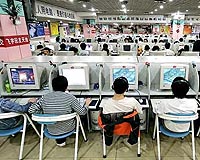| . |  |
. |
Washington (AFP) Jan 29, 2010 The United States' economic relations with China are headed into the rocks, with Beijing's new government procurement policy delivering a major blow, US experts said Friday. "I think we're going to see the bilateral economic relations with the Chinese deteriorate over the next year or so," said Bill Reinsch, president of the National Foreign Trade Council. The increasingly strained relations with China were mostly Beijing's fault because the Chinese authorities have backed away from a market-oriented direction and resorted to more subsidies and investment restrictions, Reinsch said. "We're going to head into a period of both sides testing the other," he said at a roundtable discussion hosted by the Washington-based business association. Reinsch predicted that attacks against China's economic policies "will escalate" in Congress, especially as the country faces mid-term elections in November. "For a country like ours whose strength is innovation... being able to exploit your own intellectual property is absolutely critical to our future economic growth," said the head of the council, which represents more than 300 companies, including General Electric and Chevron. The National Foreign Trade Council was among 19 groups this week that petitioned top US officials, including Secretary of State Hillary Clinton and Treasury Secretary Timothy Geithner, in a letter protesting China's "indigenous innovation" programs that they say shuts out American companies. The latest Chinese policy, announced in November, requires that eligibility for Chinese government procurement is based on whether the products contain intellectual property that is developed and owned in China. "The Chinese government has promulgated a series of 'indigenous innovation' programs as part of a long-term plan that threaten to exclude a wide array of US firms from a market that is vital to their future growth and ability to create jobs here at home," the groups wrote. "We urge you to make this a strategic priority in our bilateral economic engagement with China." Growing trade frictions between the world's largest developed and developing countries have produced a spate of new tariffs and finger-pointing in recent months. John Stubbs, the head of the Global Innovation Forum, a GE-backed council project, said his group was created to "inform" the political debate about the importance of intellectual property and intellectual property rights. He said that China's procurement policy "was top of the list" for the forum's so-called "brain trust" of leaders, ranging from the Massachusetts Institute of Technology to the University of Pennsylvania's The Wharton School. The controversial policy hurts China, too, he argued. "It walls off the vast engineering community" in China from cooperating and participating in joint research and development (R&D) projects on a number of issues. Reinsch forecast a shift in investment patterns. "Over five years you're going to see more and more investment going to India, Brazil and other places and not in China because people are just getting frustrated and tired and want to be someplace where there's rule of law," he said. Alan Wolff, a US ambassador who leads law firm Dewey & LeBoeuf's international trade practice, cited a study by his firm that found that little of US semiconductor firms' R&D investments went to China. Wolff, a former US Trade Representative negotiator under the Carter administration in the 1970s, said investment went to central Europe, where he said there were a lot of good engineers and "not the concerns over intellectual property protection." "The Chinese policies have their own direct impact. Companies actually vote where they place their investments. There are negative aspects to these policies that have immediate costs," he said.
Share This Article With Planet Earth
Related Links Global Trade News
 Google row threatens China web development: analysts
Google row threatens China web development: analystsBeijing (AFP) Jan 29, 2010 The row between Google and China is damaging for the development of the Internet in the country and it would be a major blow to the world's biggest online market if the US firm were to leave, experts say. Both sides have much to lose if the dispute over cyberattacks which Google said were launched from China and state censorship is not resolved, they say, while warning that finding the accep ... read more |
|
| The content herein, unless otherwise known to be public domain, are Copyright 1995-2010 - SpaceDaily. AFP and UPI Wire Stories are copyright Agence France-Presse and United Press International. ESA Portal Reports are copyright European Space Agency. All NASA sourced material is public domain. Additional copyrights may apply in whole or part to other bona fide parties. Advertising does not imply endorsement,agreement or approval of any opinions, statements or information provided by SpaceDaily on any Web page published or hosted by SpaceDaily. Privacy Statement |